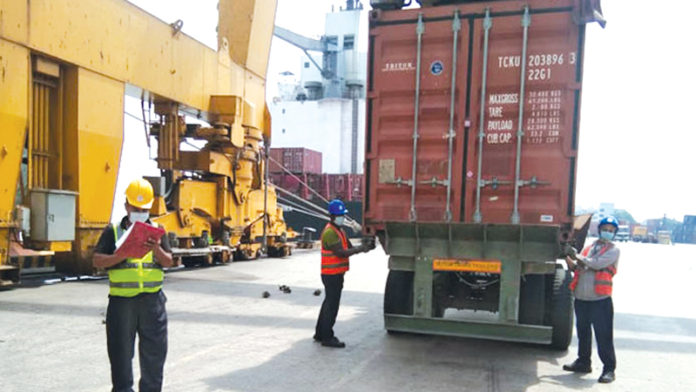Today’s world seems to be stuck in a whirlpool namedCOVID-19 (coronavirus disease). It is turning the world upside down. Rich-poor, men-women, no one is able to escape from itsgrip.Till the end of June 2020, more than 10 million people in 196 countries have been infected with the virus. At the end of April 2020, the death toll has crossed 500,000 houses; no one knows when the havoc will be over. However, it is not possible to stop the spread of this virus all of a sudden. So, prevention is more important. Since no vaccine has yet been discovered, there is no other way to stay safe than to stay away from an infected person and maintain good personal hygiene. The developed countries of the world are also continuing their efforts by declaring general holidays, complete or partial lockdown, maintaining social distance and instructing the citizens to stay at home. The government of Bangladesh has also taken several important steps under the direction of Hon’ble Prime Minister Sheikh Hasina, which includes general holiday in the country from 26 March 2020, along with increasing COVID-19 testing arrangements, setting up specialised hospitals, closing educational institutions and closing all international flights. However, Chattogramport is an exception since it remains operational to keep the economy afloat, albeit in a limited and sustained manner. Port officials are also working relentlessly and with knowing the life threatening risk. They are the front line fighters in this epidemic.
COVID-19 impact on world trade
The COVID-19 has already made a huge negative impact on global economy, disrupting healthcare in developed countries in Europe and America. Busy towns have been deserted. Due to the COVID-19 outbreak, people have become isolated from their daily activities, families and friends.
New UNCTAD data published on 11 June 2020 show that merchandise trade fell by 5% in the first quarter of the year and point to a 27% drop for the second quarter and a 20% annual decline for 2020. The latest UNCTAD figures were featured in the first edition of the Global Trade Update, the organisation’s new quarterly report providing a comprehensive snapshot of international commerce and the main issues affecting trade flows. Although the coronavirus-induced trade slowdown has spared no one, forecasts show a particularly rapid deterioration for developing countries. While south-south trade saw a drop of just 2% in the first quarter of the year, UNCTAD data shows a dramatic 14% fall in April. Preliminary data for April suggests the sharpest downturn for South Asia and the Middle East, which could register trade declines of up to 40%. Meanwhile, the East Asia and the Pacific regions appear to have fared best, with trade drops remaining in the single digits both in the first quarter of 2020 as well as in April. China appears to have fared better than other major economies in April, registering 3% growth for exports. But the most recent data indicates that the recovery may be short-lived, as the nation’s imports and exports fell by about 8% in May. The report further shows that economic disruptions wrought by COVID-19 have affected some sectors significantly more than others. In the first quarter of 2020, textiles and apparel declined by almost 12%, while office machinery and automotive sectors fell by about 8%. In contrast, the value of international trade in the agri-food sector, which has so far been the least volatile, grew by about 2%. Preliminary data for April indicates further declines in most sectors, with a very sharp contraction in the trade of energy (-40%) and automotive (-50%) products. Significant decreases are also observed in chemicals, machineries and precision instruments, with drops above 10%. On the other hand, office machinery appears to have rebounded in April, largely because of China’s positive export performance.
Impact on Maritime Bangladesh
Pragmatic handling of the global pandemic under Honourable Prime Minister Sheikh Hasina, Bangladesh has been succeeding since the day one of the infection. From 17 March 2020, all educational institution were declared close to limit the transmission. Besides, government declared general holidays from 25 March 2020 onwards. There were a complete shutdown of industries, factories, shops, hotels, transport and other commercial activities throughout Bangladesh. People were advised to stay home. It was a nightmarish scenario though we have been gaining good results out of those hard days.

However, during this time, container vessels were coming to chattogram port. Vessels had been waiting at the outer-anchorage with loaded cargos. To tackle such situation, Chattogram Port Authority decided to handle containers and cargos from the vessels. Since factories and industries were closed, importers did not take delivery of their goods, as a result the storing capacity of the port started to run short. CPA observed sharp decline in delivery after declaration of general holiday on the 25 March 2020.
Impact and prevention at Chattogram port
However, to fight this miserable pandemic, the supply-chain and ports should be operational since the lifeline of Bangladesh’s economy is Chattogram port and it facilitates 82% of country’s total imports and 91% of its exports. Therefore, a negative impact on the pace of import-export can create a huge impact on the economy of the country. To prevent the transmission of COVID-19, the country observes general holidays though Chattogram port had been operating 24 hours a day maintaining health guidelines issued by Director General Health Services (DGHS). In line with this, the activities of several port users were kept open.
The activities of Chattogram Customs House, responsible for port’s Customs clearance, were also open, initially on a limited scale. To resolve the container and vessel congestion situation a meeting was convened by Divisional Commissioner of Chattogram with all port stakeholders to keep operation of Chattogram port. The meeting emphasised on 24/7 presence of all public and private stakeholders for the smooth operation of port and to reduce the congestion of both vessels and containers. After that meeting,Customs House started full operation under the revised directives of the NBR. The presence of plant quarantine, atomic energy officials and private sytakeholders found more available to expedite delivery.Most of the containers arrive at Chattogram port contain imported raw materials for ready-made garment factories. Raw materials for different industries take the second place. The rest are fruits, ginger, garlic, onions and marine fish mostly the perishable goods imported in reefer containers.
To decongest the port the Chattogram Port Authority (CPA) waived store rent i.e. rent of all types of containers imported through the port as the importers can not take delivery of their cargo due to COVID 19 holiday declared by the government. The decision of store rent waiver helped Chattogram port to bring back the normal operation and it acts as an incentive to the importers.
In an ideal and normal situation, containers can be stored free at the port for four days after unloading from the ship. Then in the first step (next seven days), an importer has to pay USD 6 per day for each container. In the second step (eighth to 20th day), an importer has to pay USD 12 and in the last step (after 20th day) USD 24. Later, at the request of BGMEA, CPAwaived the store rent for the second time only for the raw materials of the ready-made garment factories. However, as per request of the port, the Ministry of Shipping has taken the issue into consideration to ensure this facility for all and approved the discount for all types of goods. The discount was available if the containers imported during the general holidays and unloaded by 16 May 2020.

Chattogram port on 23 April 2020 to give necessary directions to prevent the COVID-19 pandemic
Chattogram port has provided incentive facility of BDT 138 crore to traders and industrialists in the form of store rent waiver in two stages. As a result, the port is going to face two types of losses. First, there will be a revenue shortage of BDT 138 crore. Second, the loss of operational cost for long-term storage and maintenance of these goods is at least BDT 20 to 30 crore. Moreover, low revenue means low income for the country since the government gets income tax at the rate of 25% on the income of the port.
Coordinated efforts to overcome the crisis
The container capacity of Chattogram port is 49,018 TEUs. At the end of 14 April 2020, 47,413 TEU containers were stored in the port. On 15 April 2020, a letter was sent to the Ministry of Shipping seeking the approval of the National Board of Revenue to remove at least 15,000 to 20,000 TEU containers from the port yard and send them to private Inland Container Depots (ICDs).
Meanwhile, an emergency coordination meeting was held at Chattogram Circuit House on 14 April 2020 in the presence of port authority, port users, administration, public representatives and heads of intelligence agencies. Chattogram Divisional Commissioner ABM Azad, Chairman of Chattogram Port Authority Rear Admiral SM AbulKalam Azad, Chattogram Customs Commissioner M FakhrulAlam, City Mayor AJM NasirUddin, DGFI Commander Brigadier General Kabir Ahmed, ChattogramPort Board Member (Administration and Planning) Md. ZafarAlam and Board Member (Harbour and Marine) Commodore Shafiul Bari, Additional Divisional Commissioner Shankar RanjanSaha, Deputy Commissioner Mohammad IliasHossain, Additional Commissioner of Chattogram Metropolitan Police (Traffic) SM Mostaq Ahmed Khan, BKMEA Regional Head Shawkat Osman, Bangladesh Bank Director AKM Mohiuddin Azad, President of Bangladesh Shipping Agents Association AhsanulHaque Chowdhury, President of Birth Operators Association FazleIkram Chowdhury, Port Secretary of C&F Agents Association Liaquat Ali Hawlader, Director of BGMEA AnjanShekhar Das, Bangladesh Inland Container Depots Association (BICDA) Secretary Ruhul Amin Sikder were present among others.
Generally, 37 types of cargo containers, imported through Chattogram port, are unloaded at private Inland Container Depots (ICDs). An order of the National Board of Revenue (NBR) on 18 April 2020 approved the delivery of six types of goods from ICDs. The port authority insisted on unloading all kinds of goods to solve the problem quickly. As a result, on 23 April 2020 another order of NBR allowed the delivery of all types of goods. For that decision, it had been possible to remove about 27,000 TEU containers from the port.
However, there were a set of conditions. All containers must be scanned and scanning reports must be kept when transferring to ICDs. Shipments of all commercial goods transferred to ICD must be 100% physically inspected by the Customs House and representatives of the Customs Intelligence Department. Action will have to be taken on the basis of the inspection report and this order of the National Board of Revenue will be automatically revoked after 30 June 2020.

Port visit of State Minister for Shipping
State Minister for Shipping Khalid Mahmud Chowdhury MP and Secretary to the Ministry of Shipping Mohammad MezbahUddin Chowdhury rushed from Dhaka on 23 April 2020 to give necessary directions to prevent the COVID-19 pandemic in the port area and to mitigate the crises emerged from the outbreak. At a press briefing after an exchange of views with CPA and service recipients at the port building, the State Minister for Shipping expressed hope for a 50% reduction in container congestion. Later, the State Minister and Secretary visited the port premises. Their visit encouraged everyone and had further accelerated the operational activities of the port.
Port’s role in keeping the market stable
At present, each ship in the port has to pay around BDT 800,000 for an extra day’s waiting. This ultimately rests on the consumer. CPA has given priority to ships carrying medicines, ginger, garlic and onion to enter the jetty on a priority basis.
In the last week of April, the port had a stock of 1,473 tons of onions, 475 tons of ginger and 850 tons of garlic. Besides, the stock of fresh fruits was 57,500 tons. In this situation, CPA took special measures to keep the price and supply normal. Ships with at least 150 containers of such products are preferred for jetty entry. However, only one ship at a time will get this benefit. This means that a ship enjoying such benefit will have to leave the place for another similar ship to enter. According to CPA, in case of multiple ships at the same time, priority will be given on the basis of maximum number of containers a ship is carrying.
Chattogram port has written letters to the importers to take delivery of the goods as soon as possible to keep the supply chain of the country normal. Initiatives such as sending letters directly to importers are rare in recent times. Apart from this, separate letters have also been issued to Chattogram Chamber of Commerce and Industries, C&F Agents Association, Bangladesh Fresh Fruits Importers Association and Bangladesh Fruit Traders Association.
If a container of consumer goods is left for a long time, the quality of the product and the commercial price will be lost. Therefore, CPA has started sending RL (Removal Letter) to the Customs authority to auction the goods which have exceeded the deadline. Chattogram Customs has been requested to settle 12 containers of consumer goods through speedy auction in the first phase to clear container congestion, to protect government’s revenue interests and to eliminate shortage of goods in the market. This includes one container of ginger, two containers of garlic and nine containers of onion.
The port is returning to its rhythm
The country’s major seaport is benefited from various initiatives to reduce container and shipping congestion. Container congestion problem is solved and the operation has returned to normal even during general holidays and lock-down. It was recorded that 8,682 TEU containers were delivered from the port in 48 hours from 8 am on 28 April to 8 am on 30 April 2020. Prime movers, trailers, covered vans and trucks carrying containers have also increased in the port area due to the increase in deliveries. Within 24 hours from 8 am on 29 April, 2,570 boxes and 3,935 TEU containers full of imported goods were unloaded at the jetty. With export goods and including empty containers, 2,939containers have been loaded on the ship. In other words, the total container handling has been 6,874 TEUs. At that time, 69 TEU went toKamalapur ICD in Dhaka by trainand 61 TEU containers arrived at the port. 1,800 TEU containers full of imported goods have been sent to various depots in 24 hour. The number of empty containers was 182 TEU. On-chassis delivery was 688 TEUs and 1,774 TEU containers were delivered from the yard.

Apart from this, eight general cargo shipments, six food grain shipments, 18 cement clinker shipments, three oil cargo ships are being unloaded in outer ships and goods are being unloaded in small ships.
Meanwhile, BGMEA has written a letter to CPA not to collect the demurrage or detention charges of the shipping line like store rent. On 30 April 2020, BGMEA’s first vice president Mohammad Abdus Salam sent the letter to CPA Chairman.
Assistance to government funds
Officials and employees of Chattogram port have submitted one day’s salary to the Prime Minister’s Relief and Welfare Fund to assist government’s effort to prevent COVID-19. The ChattogramPort Authority handed over a fund of BDT 2,942,204 as the one-day salary from the April salary of about 6,000 port workers. Earlier, a grant of BDT 25 crore was given from the port fund through the Ministry of Shipping.
Safety first
During the announced holidays, the activities of all the departments were going on through the responsible persons as per the directive. Handheld thermometers, masks, hand gloves, PPE (Personal Protection Equipment), bleaching powder, protective goggles and disinfectant liquid and soap are being provided for the safety of the officers / employees of all the departments of the port. The port fire service unit is spraying disinfectant on the port building and its adjoining installations, various yards, jetties and residential areas every day to prevent COVID-19 outbreak.
An emergency meeting held at the office of the port’s member (Harbour and Marine) Commodore M Shafiul Bari last March made it mandatory for the ship’s captain and agent to make an appropriate announcement as soon as the ship is anchored. The master of an arriving ship must declare its COVID-19 status as soon as he arrives at the port limit. In addition, ships from other countries will be quarantined for 14 days after leaving the last port. Apart from this, when the ship reaches the Chattogram port waters, the port health officer will allow the sailors to enter the port only after scanning and declaring 100% of the sailors are not infected with COVID-19. For foreign sailors, no entry pass is being issued. At the same time, the opportunity to transfer a sailor of a ship has also been stopped. Efforts are underway to organise online berthing meetings to ensure social distance. However, container feeder vessels arriving from the container hubs of Bangladesh including Colombo, Singapore and Tanjung Pelepas port in Malaysia will be exempted from the 14-day quarantine requirement. Besides, a medical team under the supervision of the port health officer will be on duty round the clock at the port immigration desk.
On 1 July 2020, a COVID-19 unit was launched at Chattogram port hospital. It was inaugurated by the State Minister for Shipping Khalid Mahmud Chowdhury. Earlier, the port authority introduced a COVID-19 testing unit for the officers and employees of the port. As a result, they were encouraged to conduct operational activities.
Caution in Mongla
Before reaching the fairway buoy area of Mongla, the second major seaport of the country, all vessel masters have to declare a de-rating certificate with assurance that no sailor is infected with the COVID-19 on the ship. Shore passes and sailor transfer opportunities are currently closed thereas well. The same applies for Payra port too. The Ministry of Industry has banned the import of vessels for breaking or scrapping and halted the opening of LCs (Letters of Credit) for this purpose from 25 March 2020 until further notice to prevent the spread of COVID-19.
On 26 April 2020, the Chinese flagship MV Chang Hang Jing Hai, carrying 24,000 tons of coal from Indonesia, arrived at Mongla port with 20 sailors. Six Chinese sailors, including the ship’s captain, have been kept in isolation on the ship because of COVID-19 symptoms. At the same time, the unloading of the ship’s goods has been stopped, said the Monglaport health officer Dr SufiaKhatun. She said that six foreign sailors have been kept in isolation and the ship will not be allowed to unload until a full report from their medical team is received.
A comparison between last year and current year
Cargo, Container and Vessel handling at Chattogram port (Chattogram port + ICD+ ICT)
during January to June 2019

Cargo, Container and Vessel handling at Chattogram port (Chattogram port + ICD+ ICT)
during January to June 2020

After comparing these two tables, it can be said that Chattogram port has been successfully limiting the effect of COVID-19 through utmost professionalism and pragmatism.
Some recommendations
As our globalised world is facing an unprecedented health, social and economic crisis, port cities are also strongly affected due to their connection to the world. On the one hand, they had to manage many risks, and on the other hand, they needed to turn this threat into an opportunity. As there is no vaccine available yet, there will be no sudden relief from the COVID-19 outbreak. The words ‘stay home’, ‘quarantine’, ‘office from home’ will control our lives for quite some more time. It is safe to say that the economy will not be the same after this global epidemic. There will be new polarisation of friendship, cooperation and economy between countries. In order to ensure the quality of life of the citizens in a middle income country like ours in this changed situation, there must be a strong coordination between Chattogrtam port and the port users. Institutions need to be supportive of each other. It is time to pay attention to speed up the work of the port as a whole. It is not about only increasing the efficiency of the port. The skills of other concerned institutions also need to be enhanced.




